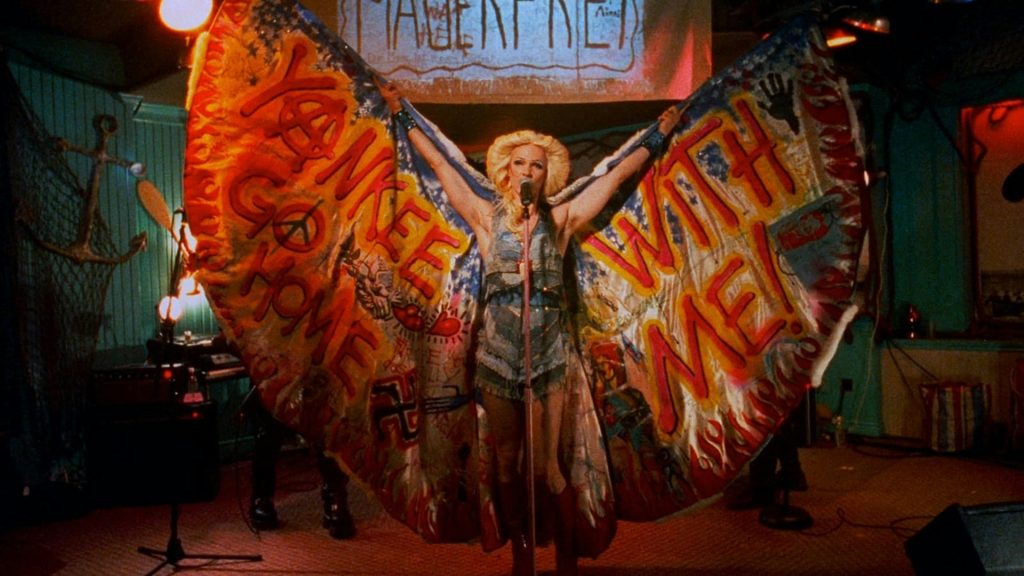Both the stage production and screen version of Hedwig and the Angry Inch start the same way, with the eponymous band running through “America, the Beautiful” as the title character takes the stage in a way that declares she will not be yielding it to anybody. (The film also opens with a brief shot of Hedwig picking her way through a crowded alley and cheekily entering the venue through the back door.) As she spreads her denim cape wide, introducing herself as “the new Berlin Wall,” the Angry Inch launches into a rocking manifesto in which Hedwig defies her “enemies and adversaries” to “try and tear me down.”
Simultaneously glamorous and confrontational, energetic and world-weary, Hedwig has a burning need to tell her story, and does so with the aid of her band (like her, all refugees from the former Eastern Bloc) — including her husband/backup singer Yitzhak, and with the running monologue she delivers between songs. Hers is a story rooted in the past and tied to the Berlin Wall, which went up the same year Hedwig was born (as Hansel) and came down one year after the botched sex-change operation she underwent to marry an American soldier and get the hell out of East Berlin. It’s a story that feels extra urgent and necessary these days, since the trans community is under fire in ways actor John Cameron Mitchell and songwriter Stephen Trask could not have imagined when they began workshopping Hedwig three decades ago.
As it was presented Off-Broadway in 1998 (debuting, appropriately enough, on Valentine’s Day), Hedwig took the form of a cabaret-style show with Mitchell as the self-proclaimed “internationally ignored song stylist” performing in the shadow of her one-time protégé, Tommy Gnosis, who sells out arenas with the songs she wrote. At various points during the show, Mitchell also played Tommy, as well as Hedwig’s mother, and Luther, the American soldier she married. When the time came to translate Hedwig to the screen – and it was such a phenomenon, this was all but a given – Mitchell expanded these roles in his capacity as screenwriter and director. He also created the role of Hedwig’s indefatigable manager Phyllis Stein, who’s only mentioned in passing in the stage play, and made it significant enough to attract SCTV vet Andrea Martin, who’s second-billed, although some of her more outrageous moments wound up on the cutting room floor. Then again, Hedwig is outrageous enough that she doesn’t need any competition.

Rather than have the story play out over a single performance in one venue, Mitchell sends Hedwig and her underpaid entourage from one Bilgewater’s Restaurant gig to the next, all of them within spitting distance of one of Tommy’s shows. Playing to bewildered and frequently hostile audiences whose only crime is wanting to have a meal in peace, Hedwig alternates between rave-ups like “Tear Me Down,” “Angry Inch,” and “Exquisite Corpse,” and downtempo numbers like “The Origin of Love” and “Wicked Little Town.” She even pulls off a literal showstopper in “Wig in a Box,” which comes along when she’s at her lowest point, and includes a singalong verse with a bouncing ball.
Moments like these demonstrate how thoroughly Mitchell thought out how to bring his cult stage hit to the screen. In addition to Hedwig’s mother and Luther, he also develops the relationship between Hedwig and Yitzhak. A fleeting moment of tenderness between them early on is ruined by Tommy Gnosis’s version of “Tear Me Down” coming on MTV, though, and there are other signs they aren’t built to last. The runner about Yitzhak’s desire to jump ship and join a touring company of Rent is proof he has his eyes squarely on the exit. (As in the original stage show, Yitzhak is played by actress Miriam Shor, adding another level of gender-bending to the film’s agenda.)
The other key role, Tommy Gnosis, went to relative newcomer Michael Pitt, who plays him with an openness and malleability that allows Hedwig to mold him into the androgynous rocker who takes off like a shot and, like everyone else in her life, leaves her in the dust. Then again, she does have a tendency to push people away. Hedwig has an edge and a way with a cutting remark – useful for self-defense, not so great for letting people get close to you. For those in her orbit, Hedwig can be exhausting, even dictatorial, but people wouldn’t remain there if it wasn’t also exhilarating. Is she a pain in the neck sometimes? Absolutely. But she’s authentic and unmistakably her own person, however much she yearns for her “other half.” When people are searching for an identity, someone who has already figured theirs out can be a beacon in the darkness, and an inspiration to don a foam Hedwig wig.
“Hedwig and the Angry Inch” is streaming on the Criterion Channel in its Criterion Edition, with all the features on the Blu-ray and more.



